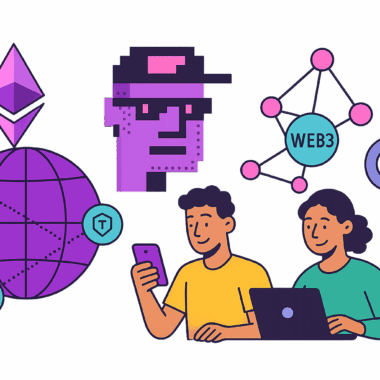

Web3 Affiliate Marketing: Tokens, NFTs & Metaverse Partners

Content:
- From Web2 to Web3: The Paradigm Shift in Digital Marketing
- Blockchain Technology and Smart Contracts in Affiliate Marketing
- Tokens and Reward Mechanisms for Affiliates
- NFTs as Loyalty and Ownership Tools
- Affiliate Marketing in the Metaverse
- Challenges and Risks in Web3 Affiliate Ecosystems
- Conclusion
- Frequently Asked Questions (FAQ)
The digital marketing landscape is evolving rapidly, and Web3 technologies are at the forefront of this transformation. Unlike traditional Web2 systems dominated by centralized platforms, Web3 introduces a decentralized internet powered by blockchain, smart contracts, and token-based economies. This paradigm shift enables users to control data ownership, ensure transaction transparency, and participate directly in the value exchange process.
For affiliate marketing, this evolution represents a profound opportunity. Decentralized ecosystems allow brands, affiliates, and consumers to collaborate through transparent, automated, and tokenized systems. By integrating blockchain, NFTs, and metaverse environments, affiliate marketing can evolve from a tracking-based model into a participatory economy built on ownership, engagement, and innovation.
From Web2 to Web3: The Paradigm Shift in Digital Marketing
In the Web2 era, data, traffic, and payments flowed through centralized intermediaries such as search engines, social networks, and affiliate platforms. While effective, this structure limited transparency and often required trust in third-party providers for tracking and revenue allocation.
Web3 disrupts this model by distributing control through decentralized protocols. Blockchain technology ensures that every transaction is traceable, immutable, and verifiable. This new approach allows affiliate partners to engage in peer-to-peer transactions without reliance on traditional intermediaries, ensuring fair attribution and faster payments.
Key differences between Web2 and Web3 marketing:
- Centralized platforms vs decentralized networks
- Manual tracking vs blockchain verification
- Delayed commissions vs instant smart contract payouts
- Data owned by platforms vs data owned by users
Blockchain Technology and Smart Contracts in Affiliate Marketing
Blockchain serves as the backbone of the Web3 affiliate model, enabling secure and transparent performance tracking. Smart contracts—self-executing agreements coded into blockchain—automate commission payouts, enforce program rules, and eliminate disputes between advertisers and affiliates.
For example, when a sale is recorded on the blockchain, a smart contract can automatically release the corresponding commission to the affiliate’s wallet. This eliminates intermediaries, reduces operational costs, and enhances trust. Moreover, blockchain data is public and immutable, which guarantees auditability and accountability in all affiliate transactions.
Benefits of smart contract-based affiliate systems:
- Instant and automated commission payments.
- Elimination of fraud and manipulation.
- Transparent performance metrics.
- Reduced administrative overhead and disputes.
Tokens and Reward Mechanisms for Affiliates
In Web3 ecosystems, tokens replace traditional currencies and reward structures. Affiliates can earn native platform tokens that represent real economic value or governance rights. These tokens can be staked, traded, or exchanged for exclusive benefits within decentralized platforms.
Tokenization allows affiliate programs to design dynamic and multi-layered reward models. Affiliates can receive base tokens for performance, governance tokens for community participation, and bonus rewards for long-term engagement. Such models transform affiliate marketing into an active partnership economy where incentives align with both brand growth and ecosystem expansion.
Common token-based incentive structures:
- Utility tokens for transactions and access.
- Governance tokens for voting and decision-making.
- Staking rewards for holding tokens long-term.
- Tokenized revenue-sharing pools for top performers.
NFTs as Loyalty and Ownership Tools
Non-Fungible Tokens (NFTs) are redefining how affiliates and consumers perceive value and exclusivity. In affiliate marketing, NFTs can serve as digital proof of membership, loyalty badges, or reward assets that provide unique privileges.
Brands can issue NFTs to affiliates who reach specific milestones or drive high-value conversions. These NFTs can grant access to premium campaigns, exclusive content, or co-marketing opportunities. NFTs also create verifiable ownership records for digital assets, ensuring authenticity and preventing duplication.
Use cases of NFTs in affiliate marketing:
- Tiered reward systems represented by collectible NFTs.
- Gamified affiliate challenges with NFT prizes.
- Token-gated communities offering early campaign access.
- NFT-based certifications verifying partner achievements.
Affiliate Marketing in the Metaverse
The metaverse—a network of interconnected 3D virtual environments—introduces a new frontier for affiliate engagement. Within metaverse spaces like Decentraland, The Sandbox, or Meta Horizon, users interact through avatars, virtual stores, and immersive brand experiences.
Affiliate marketing in the metaverse can leverage interactive placements, event sponsorships, and digital goods promotion. For instance, affiliates could host branded virtual events, promote NFT merchandise, or earn commissions from in-world product activations. This model merges experiential marketing with decentralized economics, offering unprecedented engagement potential.
Examples of metaverse affiliate initiatives:
- Virtual storefronts featuring affiliate-linked products.
- Branded experiences within gaming environments.
- NFT airdrops and community-based referral programs.
- Avatar-based influencer collaborations.
Challenges and Risks in Web3 Affiliate Ecosystems
Despite its potential, Web3 affiliate marketing faces technical, regulatory, and operational challenges. Smart contract bugs, token volatility, and lack of regulatory clarity can pose significant risks to both affiliates and advertisers.
Scalability and interoperability remain pressing issues, as blockchain networks vary in performance and cost-efficiency. To address these challenges, many brands adopt hybrid models—combining Web2 infrastructure with Web3 innovation—to ensure compliance and usability while gradually transitioning toward decentralization.
Main challenges include:
- Regulatory uncertainty around digital assets.
- Volatile token prices impacting earnings.
- Complex onboarding for non-technical affiliates.
- Security vulnerabilities in smart contracts.
|
Challenge |
Description |
Possible Solution |
| Regulation | Unclear global rules for crypto-based marketing. | Adopt hybrid compliance and legal audits. |
| Security | Smart contract bugs or wallet vulnerabilities. | Third-party audits and secure contract frameworks. |
| Adoption | Complex interfaces for new affiliates. | User-friendly Web3 onboarding solutions. |
Conclusion
Web3 affiliate marketing marks a new era of transparency, automation, and value distribution. By combining blockchain integrity with tokenized incentives and metaverse engagement, brands can create ecosystems where every participant benefits equitably.
While technical and regulatory challenges remain, the long-term potential is significant. Forward-looking marketers who experiment with decentralized technologies today will shape the affiliate landscape of tomorrow—one built on ownership, participation, and trust.
Frequently Asked Questions (FAQ)
1. What is Web3 and how does it differ from Web2 in affiliate marketing?
Web3 is a decentralized version of the internet powered by blockchain. Unlike Web2, it enables direct, peer-to-peer interaction without intermediaries, providing greater transparency and ownership.
2. How can affiliates earn tokens instead of cash?
Affiliates can receive cryptocurrency or platform tokens as commissions through blockchain transactions. These can be staked, traded, or used within decentralized ecosystems.
3. Are NFT-based affiliate programs secure?
Yes, NFTs rely on blockchain authentication, ensuring that ownership and provenance data cannot be falsified. However, brands must implement robust smart contract security.
4. How can brands operate in the metaverse?
By creating branded virtual experiences, partnering with influencers, and enabling affiliate interactions through immersive environments like Decentraland or The Sandbox.
5. What are the main challenges to scaling Web3 affiliate systems?
Challenges include regulation, user adoption barriers, and technical complexity. Solutions involve hybrid Web2-Web3 integrations and continuous technological education for affiliates.
5 Safety Tips Before Finding Affiliates
Affiliate marketing can be an effective way to drive traffic and increase sales, but only when it’s done correctly. As a matter of fact, there are many benefits for your business from partnering with affiliates. If you’re thinking about creating an affiliate program for your business, check out these tips on how to do it responsibly and ethically.

Does Affiliate Marketing Work for B2B? Enterprise Companies Winning with This Channel
B2B affiliate marketing is a performance-based strategy in which businesses partner with external publishers, influencers, or thought leaders to drive qualified leads and sales. Unlike B2C, where affiliates focus on consumer traffic and immediate purchases, B2B affiliates promote services or solutions aimed at other businesses—often involving longer sales cycles and higher-value transactions.

The Future of Performance Marketing: AI, Automation, and Attribution
The future of performance marketing will be defined by precision, real-time adaptation, and smarter use of first-party data. This article examines how AI, marketing automation, and modern attribution frameworks are reshaping performance-based strategies—and what marketers must do to adapt.



